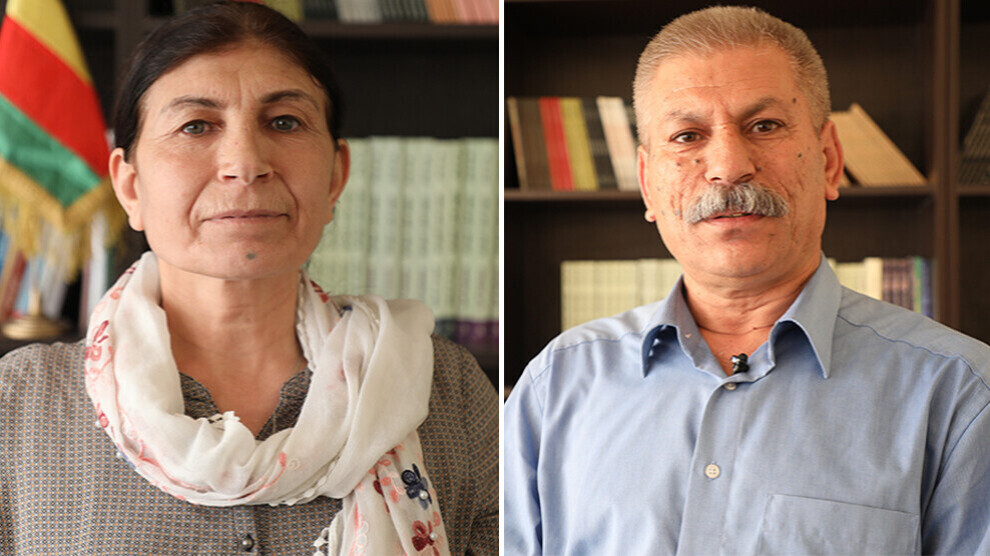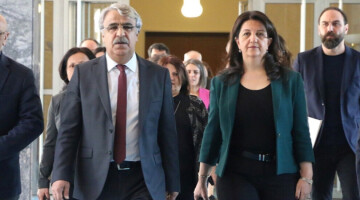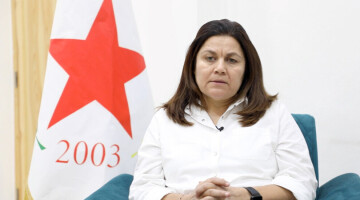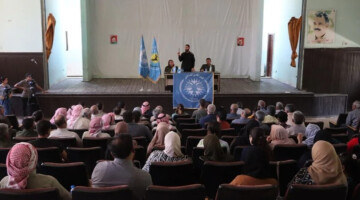While the Iraqi government is militarily besieging the Yazidi settlement area of Shengal, the Turkish state is attacking the Zap region in South Kurdistan with the active support of the KDP and the autonomous region of northern and eastern Syria with the help of mercenaries. In northern Syria/Rojava, the attacks are currently concentrating primarily on the Shehba canton in the north of Aleppo.
Rûken Ehmed and Xerîb Hiso, the co-chairs of the civil society umbrella organization TEV-DEM in Rojava, see this simultaneous wave of attacks in Zap, Shengal and Shehba as an attempt to break the will of the Kurdish people.
Rûken Ehmed told ANF: “The people of South Kurdistan and Shengal need to know that they are not alone. Women and especially mothers are carrying out a strong resistance said that they will stand by the fighters and defend Shengal.”
The KDP, on the other hand, which is dominated by the Barzani family, represents the betrayal, against which the population in particular in South Kurdistan must protest. Ehmed said: “An organized resistance must take place against the betrayal. People need to believe that if they organize and fight against it, they can neutralize betrayal. The resistance of the peoples will crush fascism and betrayal. Our people must be aware of the reality of the Barzani family. It is sacrificing its people to self-interest and profit.”
Regarding the guerrillas' fight against the Turkish occupation attacks, Rûken Ehmed said: "The guerrillas are not alone, they are the hope of the people. We are in the year of liberation, and everyone has a part to play. The people from all over Kurdistan must rise up and increase their struggle. The people of Rojava have a big task to carry out. All political parties, the Autonomous Administration and civil society organizations must strengthen and support the resistance.”
The other co-chair of TEV-DEM, Xerîb Hiso, pointed out that Turkey, Iraq, Syria and the KDP want to destroy the achievements of the Kurdish people and break their will. For this purpose, a wide area from Shehba to the Zap region has been turned into a theater of war.
Hiso said: “The Iraqi government is attacking Shengal with the support of the KDP. In the entire border area, the Kurdish and Yazidi people should be deprived of the opportunity for self-determination. Our people are bravely resisting this dirty and dangerous policy. As TEV-DEM we support this resistance.”
According to Xerîb Hiso, some Kurdish parties have put themselves at the service of the AKP/MHP government and are taking action against the Kurdish people together with the Turkish state. “They are not thinking about the future. We must not just condemn the occupation and the betrayal. Rather, we need to show the reality behind it. Why is the KDP involved in this dirty plan? Everyone must take responsibility and take a stand. Staying out is not possible in the current phase. We have to be constantly active now.”
The determined struggle of the guerrillas in the Zap region is also having an impact on Northern and Eastern Syria, the co-chair of TEV-DEM added. This fight must be supported, he said, adding: “People see the resistance in the Zap and in Avaşîn as their own fight, the victory of the guerrilla is their own victory. If the enemy wins there, bad things will happen in northern and eastern Syria as well. However, if it loses, the will here is strengthened. The struggle and the will of the peoples are interdependent; both have united against the attacks. In North and East Syria, the resistance from Shehba to the Zap is seen as a future victory.”
Co-Chairs Rûken Ehmed and Xerîb Hiso
Rûken Ehmed comes from Kobanê and has been active in revolutionary work since 1993. During this period, she has worked in all areas of north-eastern Syria as well as in Aleppo and Damascus. She is also a member of the women's association Kongreya Star.
Xerîb Hiso was born in Afrin in 1967. He is Yazidi and father of four children. He has been involved in the Kurdish liberation movement since 1984 and was arrested three times, most recently in 2011. He played a key role in the founding of the PYD in 2003 and was the representative of the PYD and TEV-DEM in Southern Kurdistan for four years.















